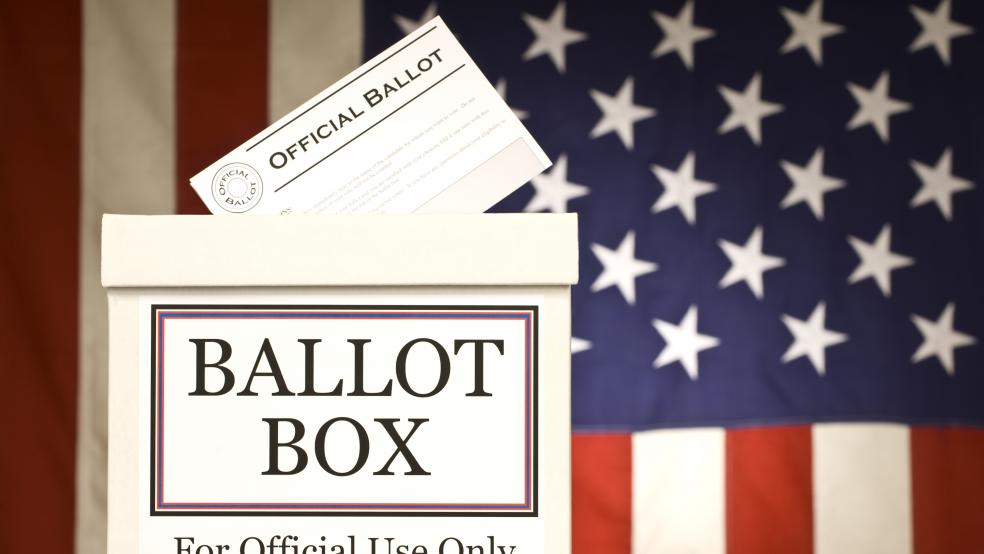It seems almost cruel to offer up one more thing for American voters to worry about in this wretched election season, but in recent days we’ve been reminded that even after all the ballots are counted on Tuesday night -- even if we think we know who the winner of the presidential race is supposed to be -- we might still wind up in a state of uncertainty.
That’s because in the weird system we use to elect a president in the US, there’s one last human link in the chain between the ballot box and the final result, and it can be broken. As we all learn in Middle School civics, and then promptly forget, when casting a ballot for president we are technically voting not for the candidate, but for a slate of “electors” who pledge to cast their votes for that candidate in the Electoral College, the body that officially selects the president.
Related: Has Trump Put Michigan and Minnesota in Play? Probably Not
On rare occasions over the years, though, electors prove to be “faithless” -- meaning that they break faith with the voters who chose them and cast their vote in the Electoral College for someone other than the candidate they had pledged to support.
Within the past week, two electors in Washington state pledged to support Hillary Clinton, have said that if she wins the election in their state, they may cast their votes for someone else.
One of them, Robert Satiacum, who supported Vermont Sen. Bernie Sanders in the Democratic primary, says he absolutely will not vote for Clinton, even in the unlikely event that his vote puts Republican Donald Trump in the White House.
“No, no, no on Hillary. Absolutely not. No way,” he told the Seattle Times. “I hope it comes down to a swing vote and it’s me...She ain’t getting it. Maybe it’ll wake this country up.”
Related: Gary Johnson’s Fading Run Could Be the Margin of Victory for Clinton or Trump
A second Washington state Democratic elector, Bret Chiafolo, said that he has not made up his mind, but that he is also considering a vote for someone other than Clinton if she wins the state.
In August, an elector on the ballot in Georgia pledged to Donald Trump, told the Atlanta Journal-Constitution that he was furious with the Republican nominee’s decision to attack the parents of a US soldier killed in Iraq after the father criticized him.
“I will not be voting for Donald Trump in the general election,” elector Baoky Vu said. “My conscience is clear but my soul is being tested...Trump’s antics and asinine behavior has cemented my belief that he lacks the judgment, temperament and gravitas to lead this nation. Forget political incorrectness, this is simply despicable demagoguery.”
Within hours, though, Vu resigned under pressure, to be replaced by the state Republican Party with another elector.
Related: Trump's Rise in the Polls Is Changing the Market’s Risk Calculus
What’s particularly unsettling about faithless electors is that there is nothing to force them to declare their intentions in advance. And at least once in recent history, an elector has broken faith with voters in the comfort of anonymity. In Minnesota, after the 2004 election, an unknown elector cast a vote for Democratic vice presidential nominee John Edwards for both president and vice president. It remains unclear whether it was an intentional act or not, but it cost Democratic presidential nominee John Kerry an electoral vote.
In 2000, a Washington, DC elector pledged to Al Gore cast a blank ballot in protest against the District of Columbia’s lack of representation in Congress. In that case, it didn’t affect the outcome -- but the fact that George W. Bush won only 271 electoral votes -- one more than a bare majority -- shows how close US elections can be.
Several others over the past few decades have chosen to cast votes for candidates other than the one they were pledged to, or to write in people who were not candidates at all. According to the website Fairvote.com, there have been 157 faithless electors in the history of the Electoral College, though 71 of them changed their votes because the candidate they were pledged to had died before the electoral college met. (Electors meet in their respective state capitals on the Monday after the second Wednesday in December.)
To date, faithless electors have never actually affected the outcome of a presidential election. But if the results of Tuesday’s voting is a close split of the electoral college -- or even a (very unlikely) tie -- the prospect of faithless electors will be one more reason for Americans to continue biting their nails even past Election Day.





